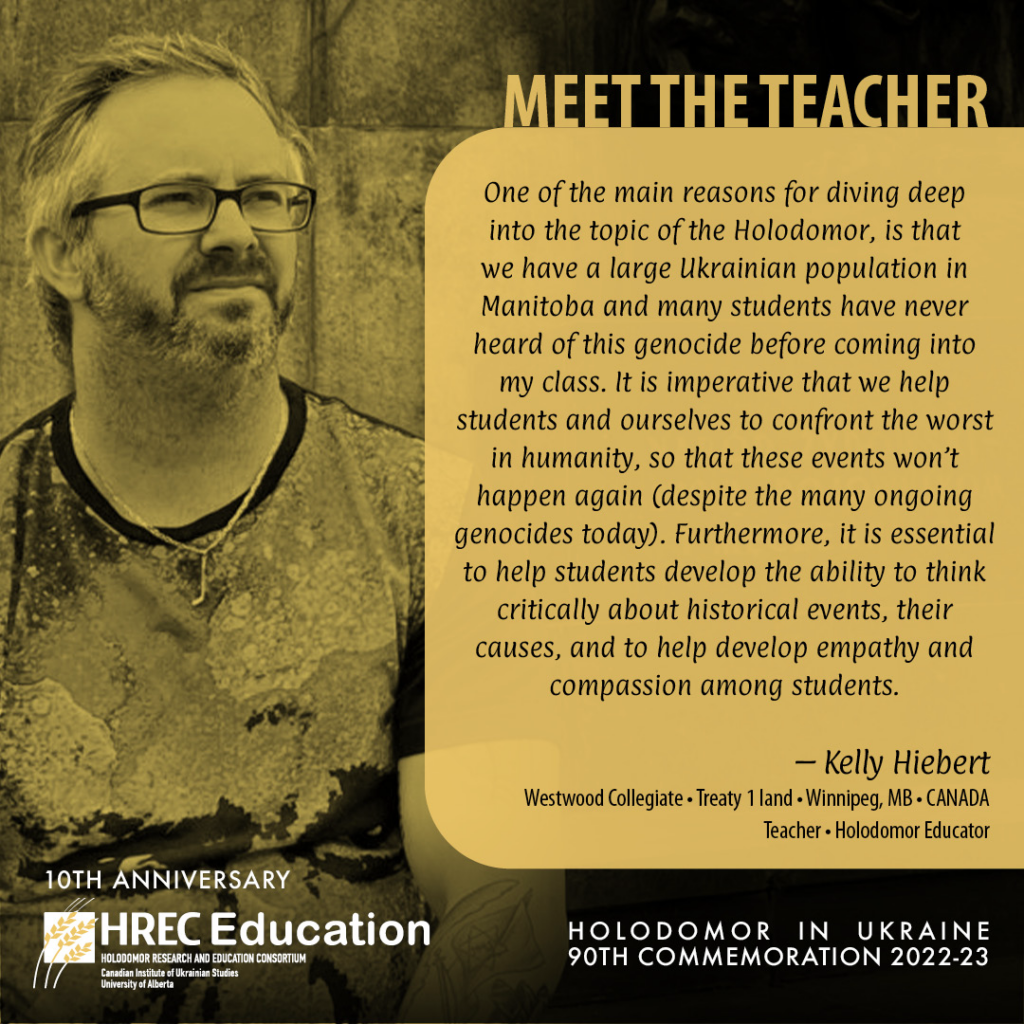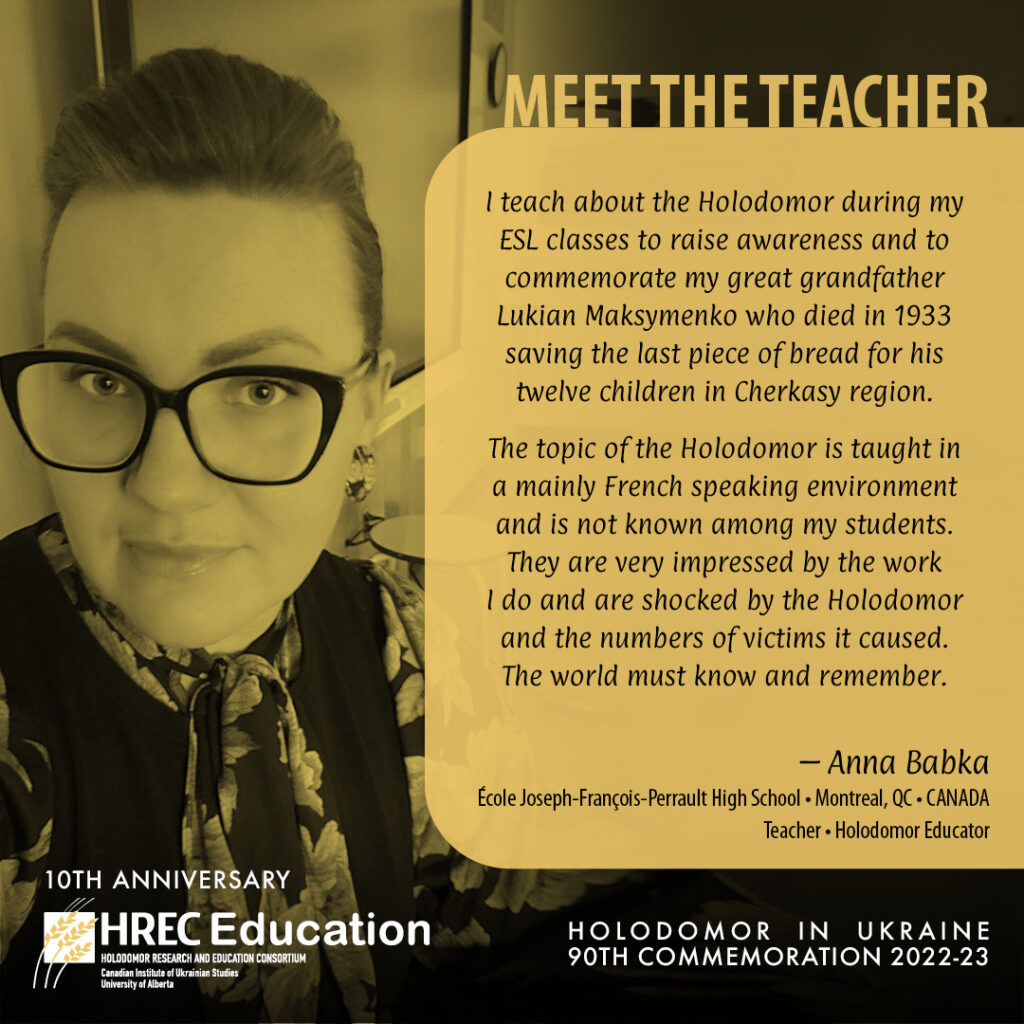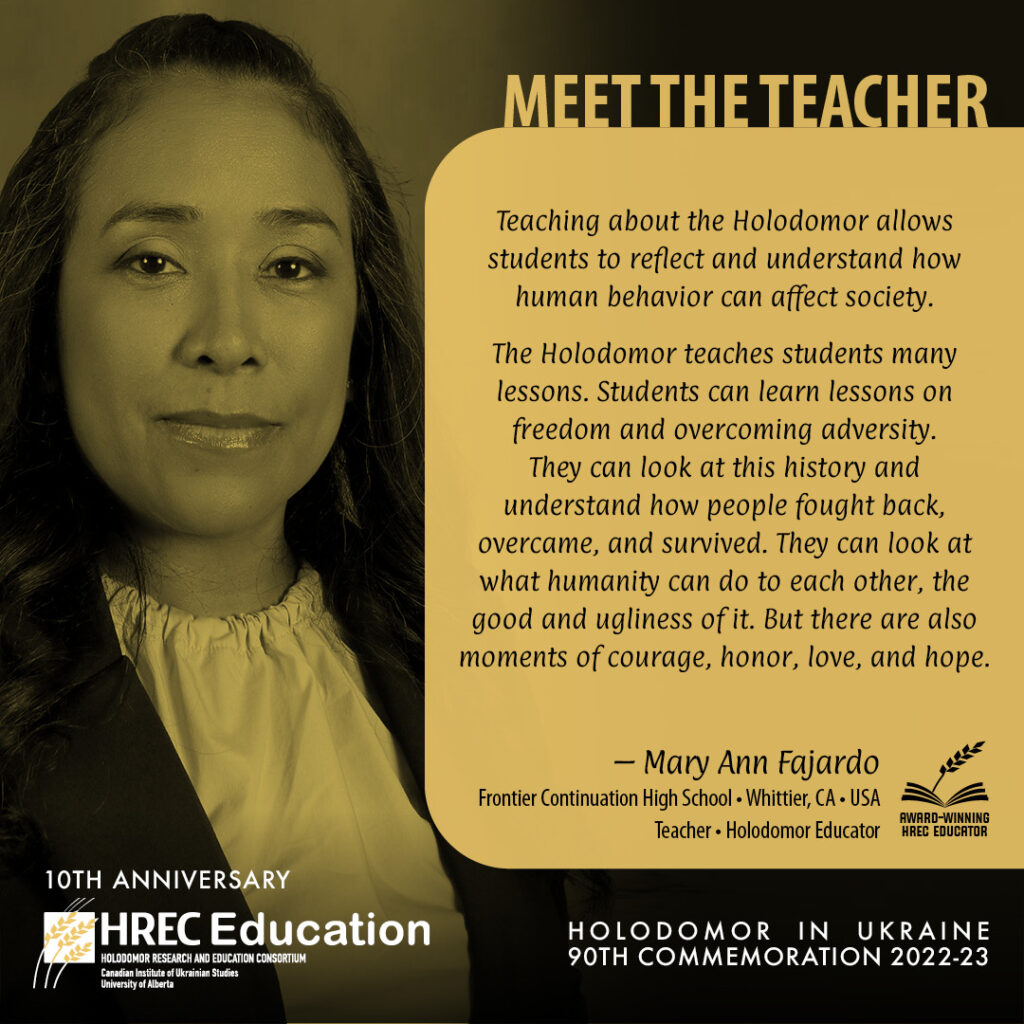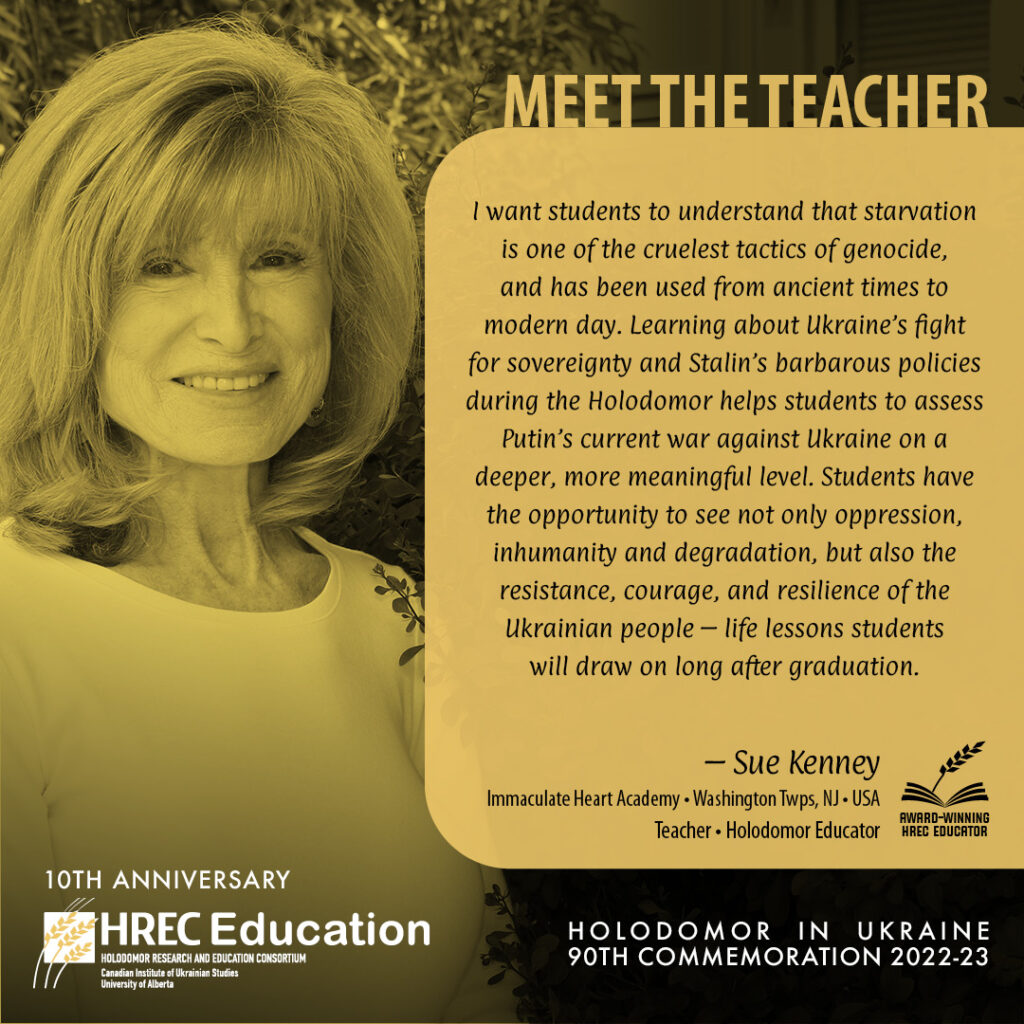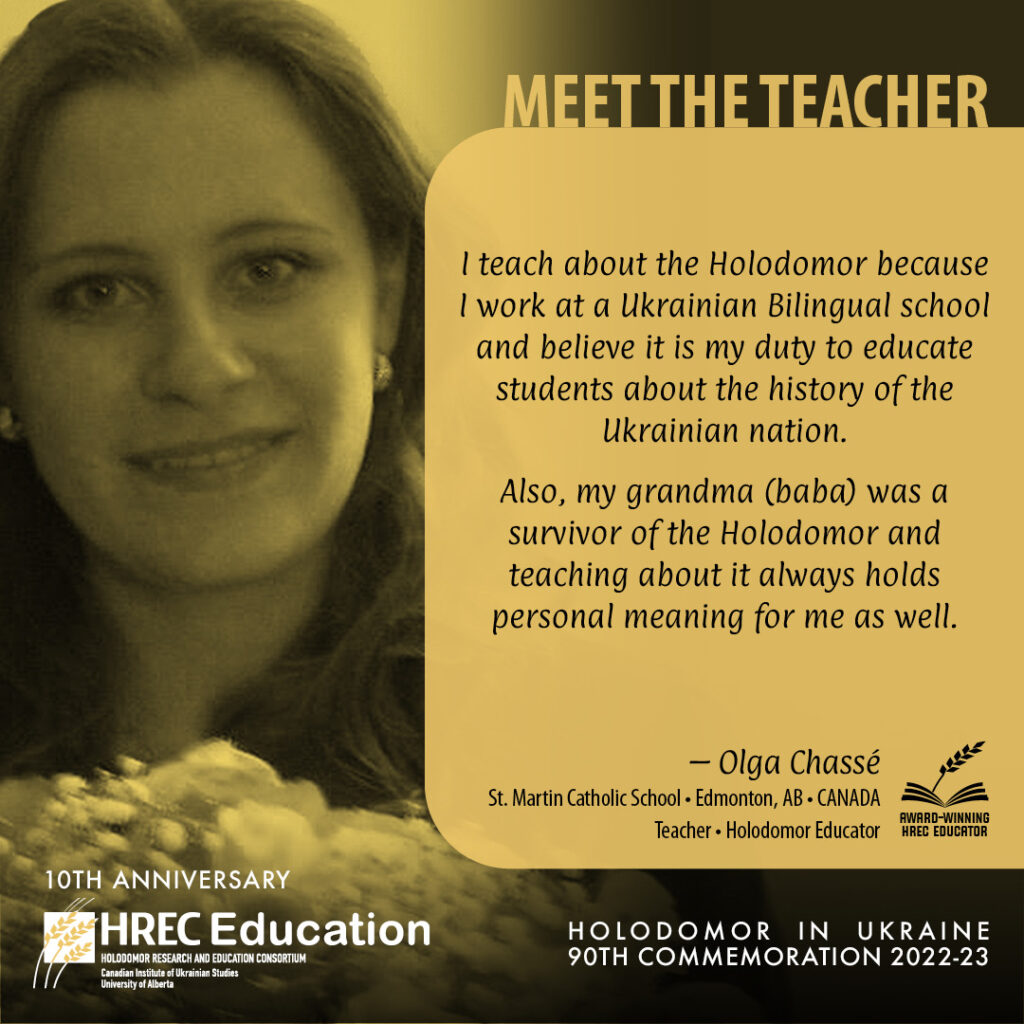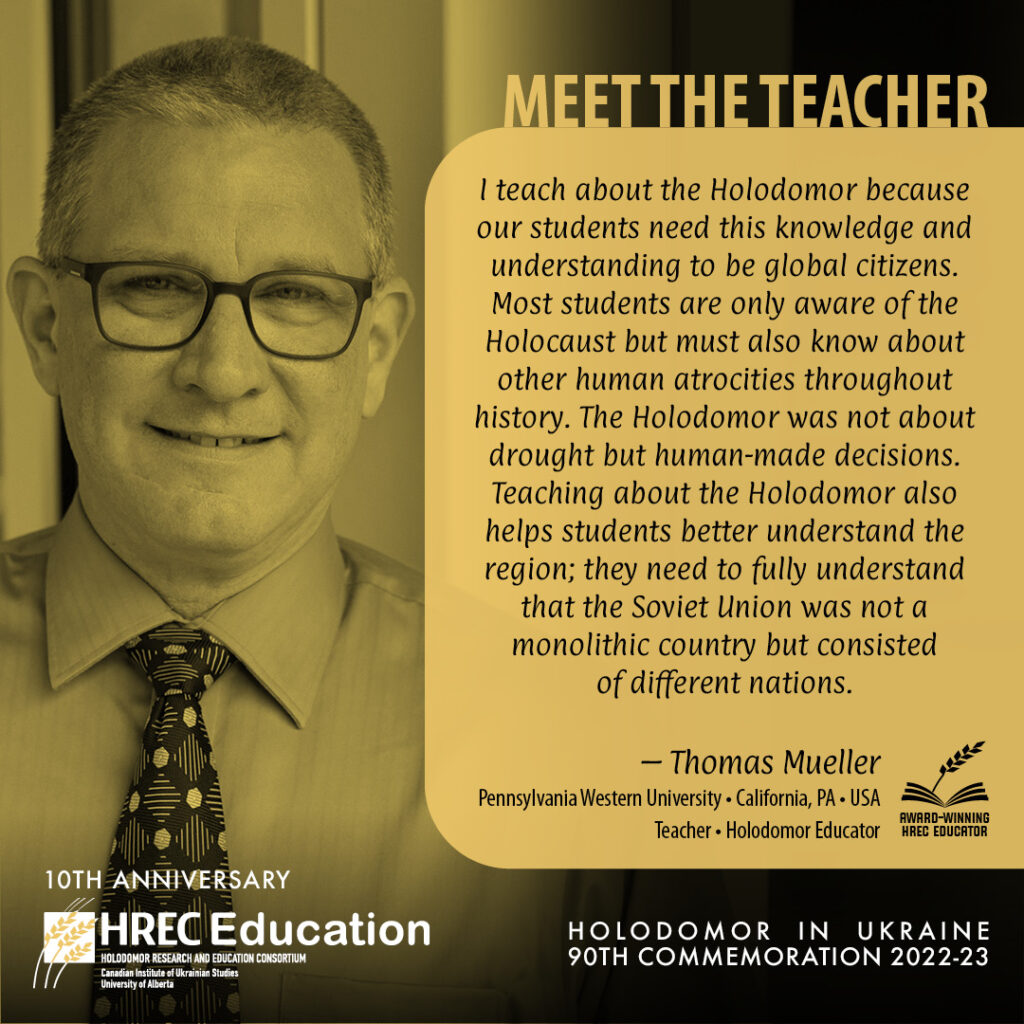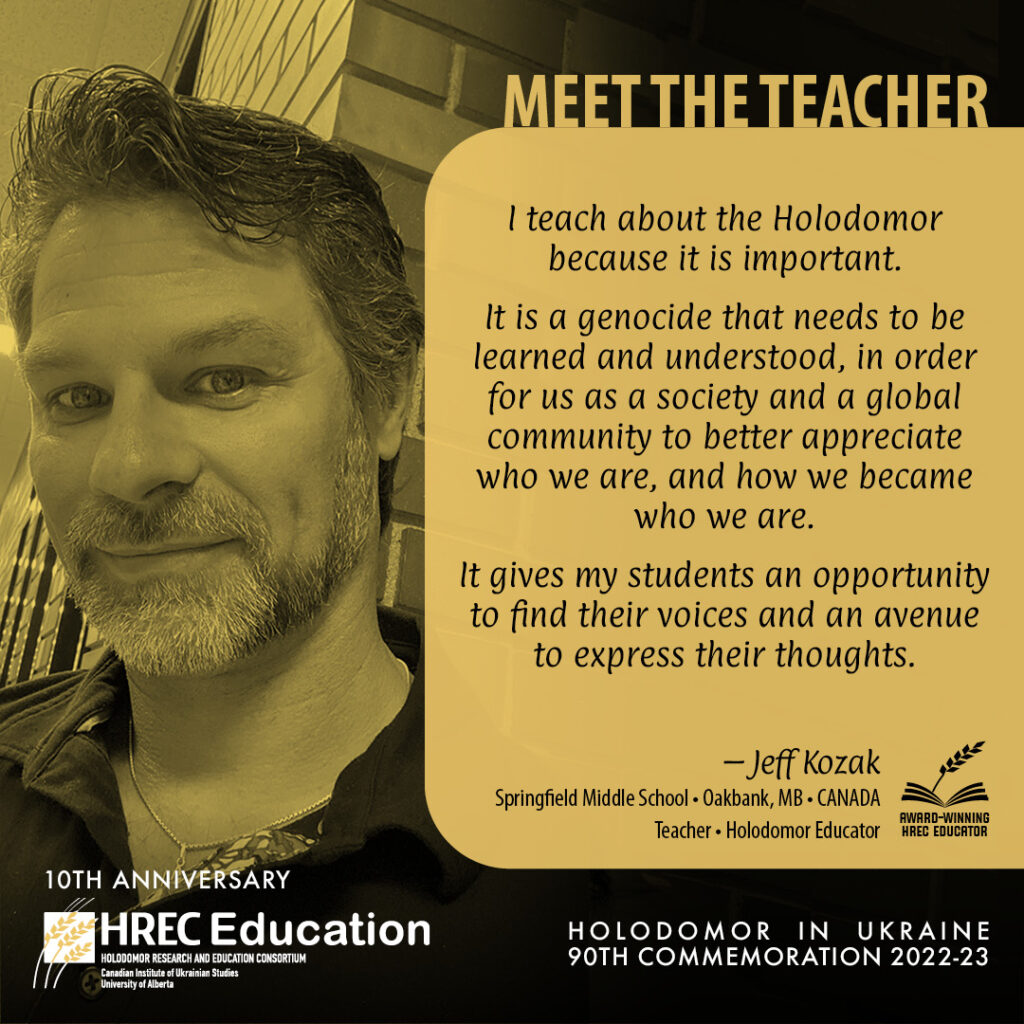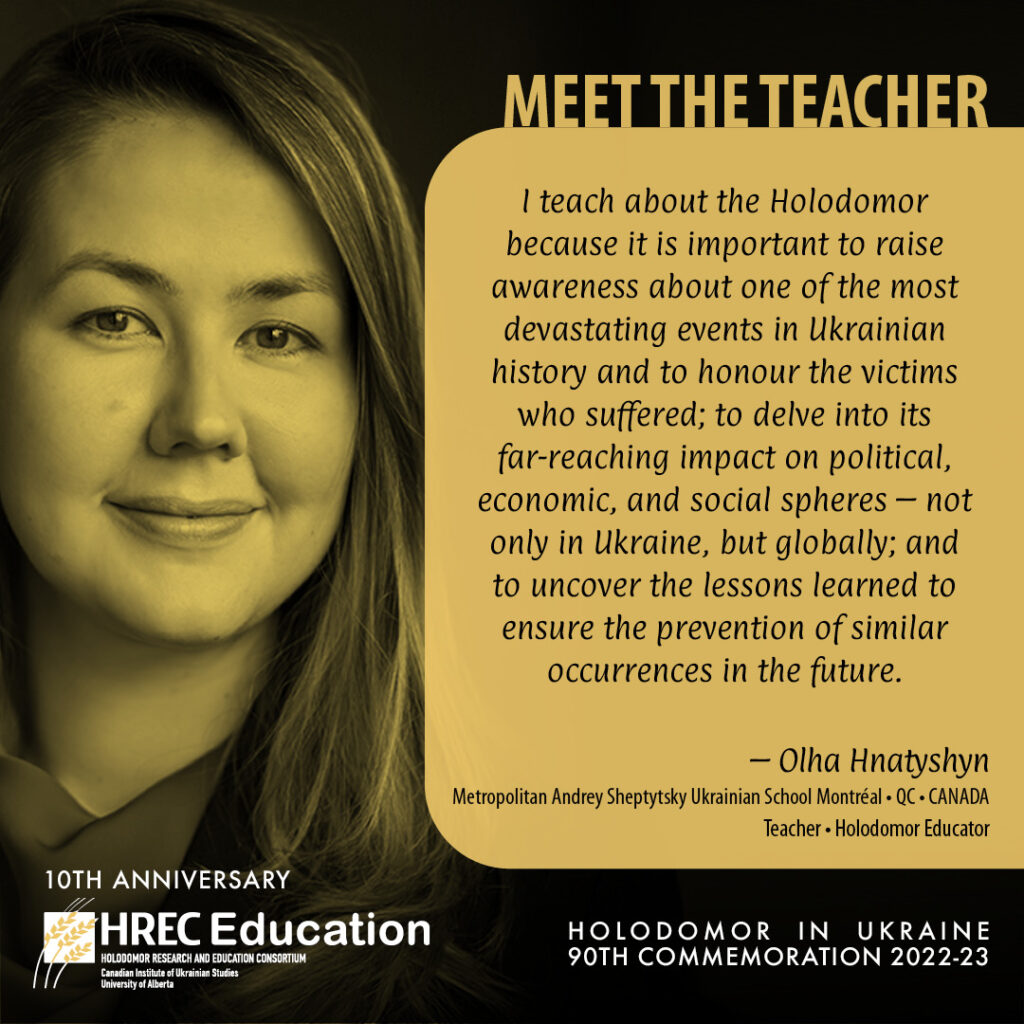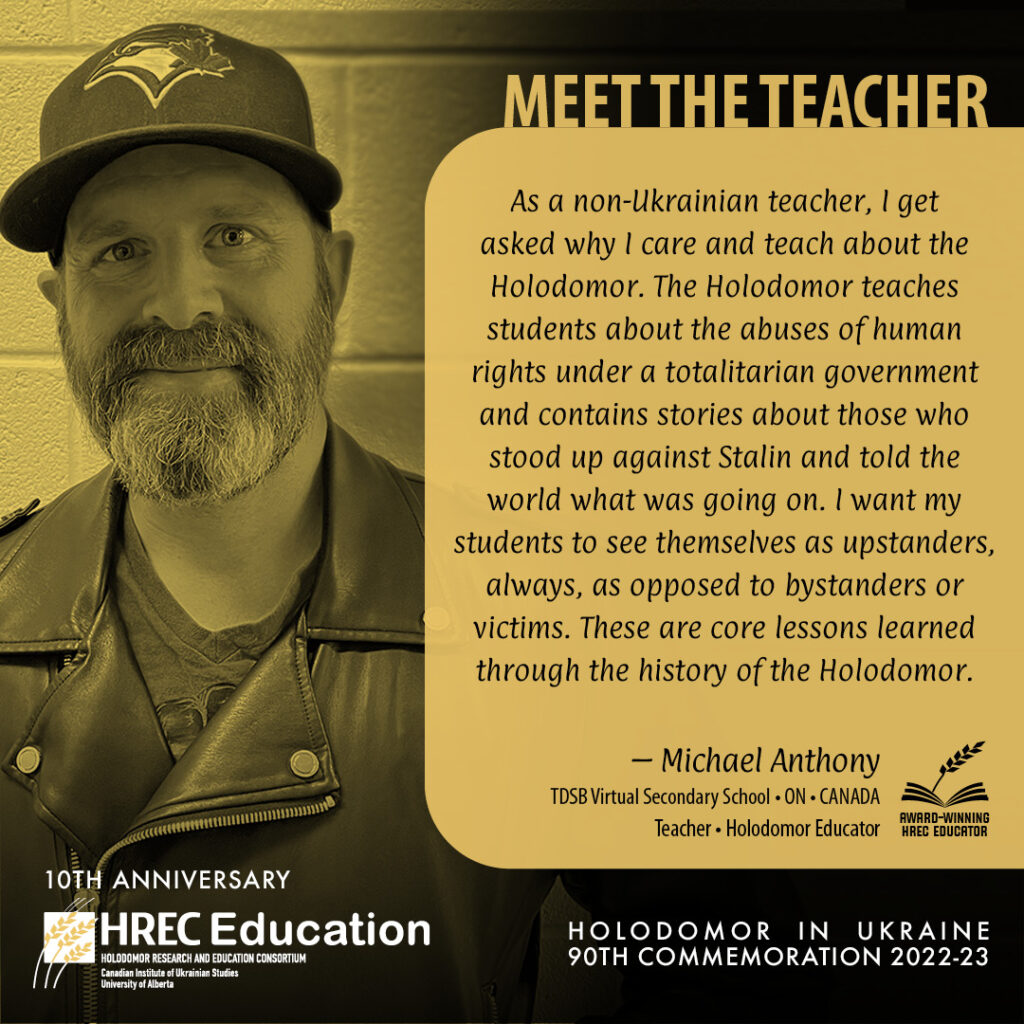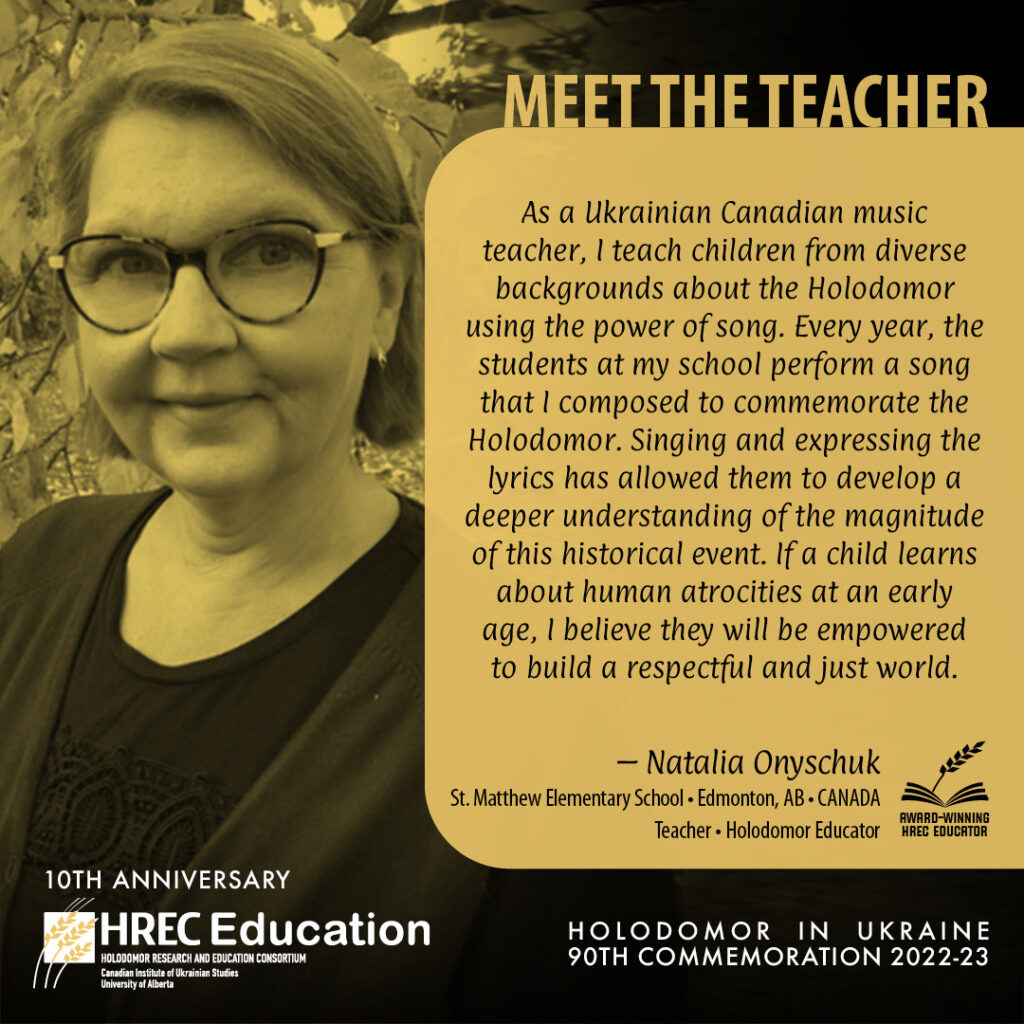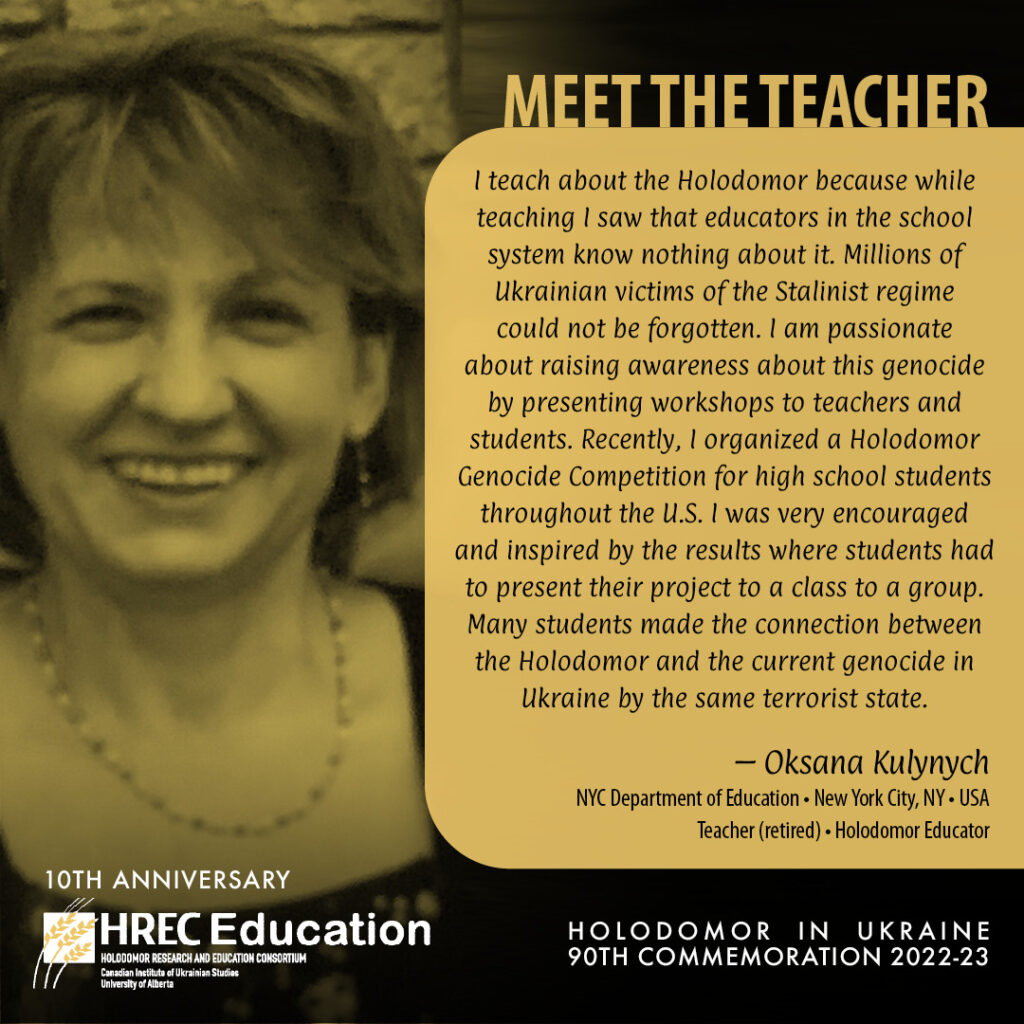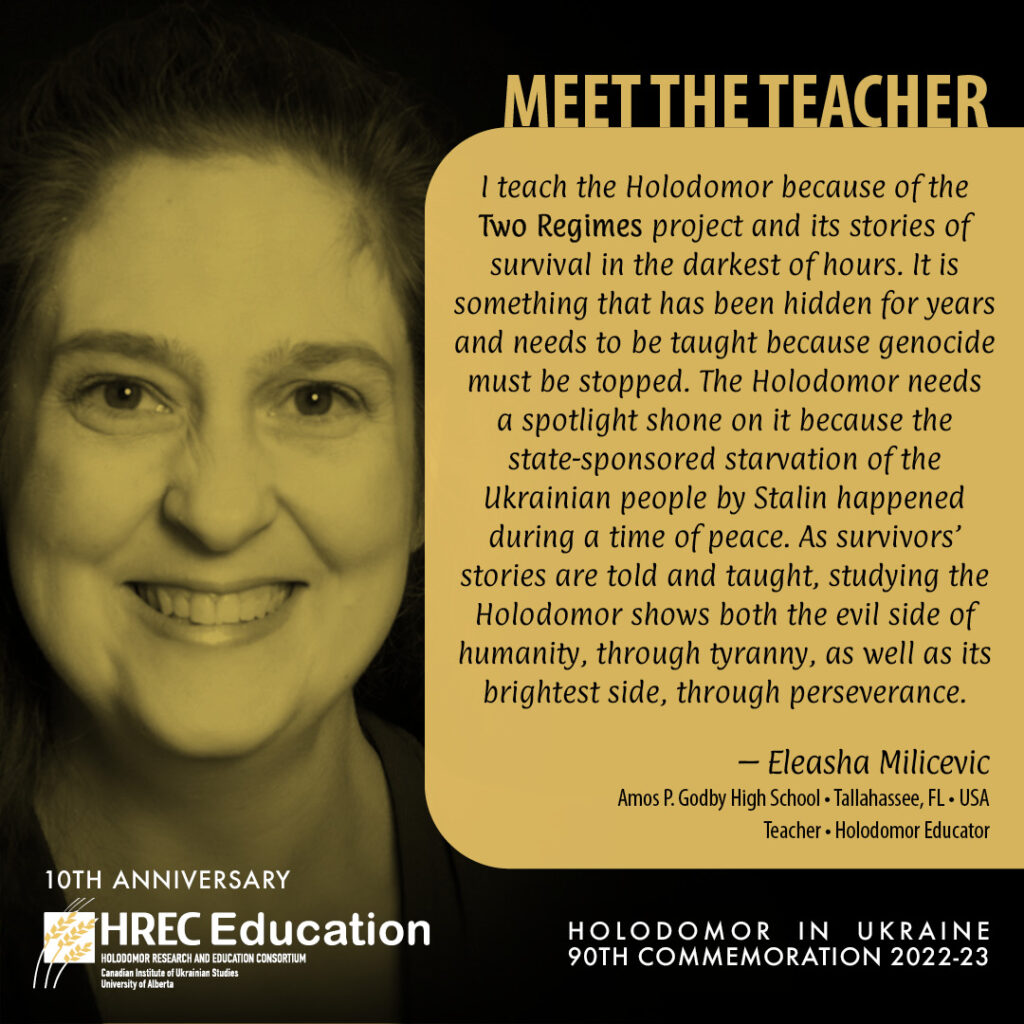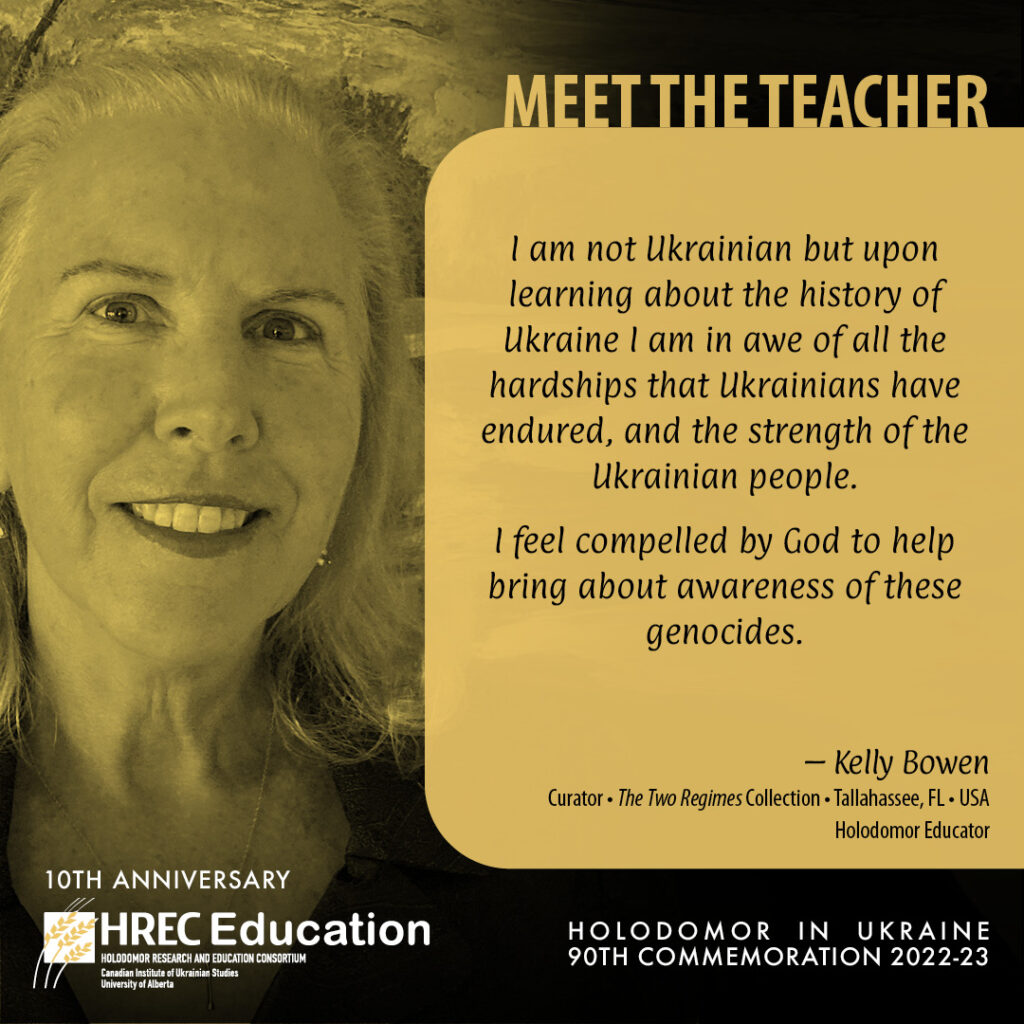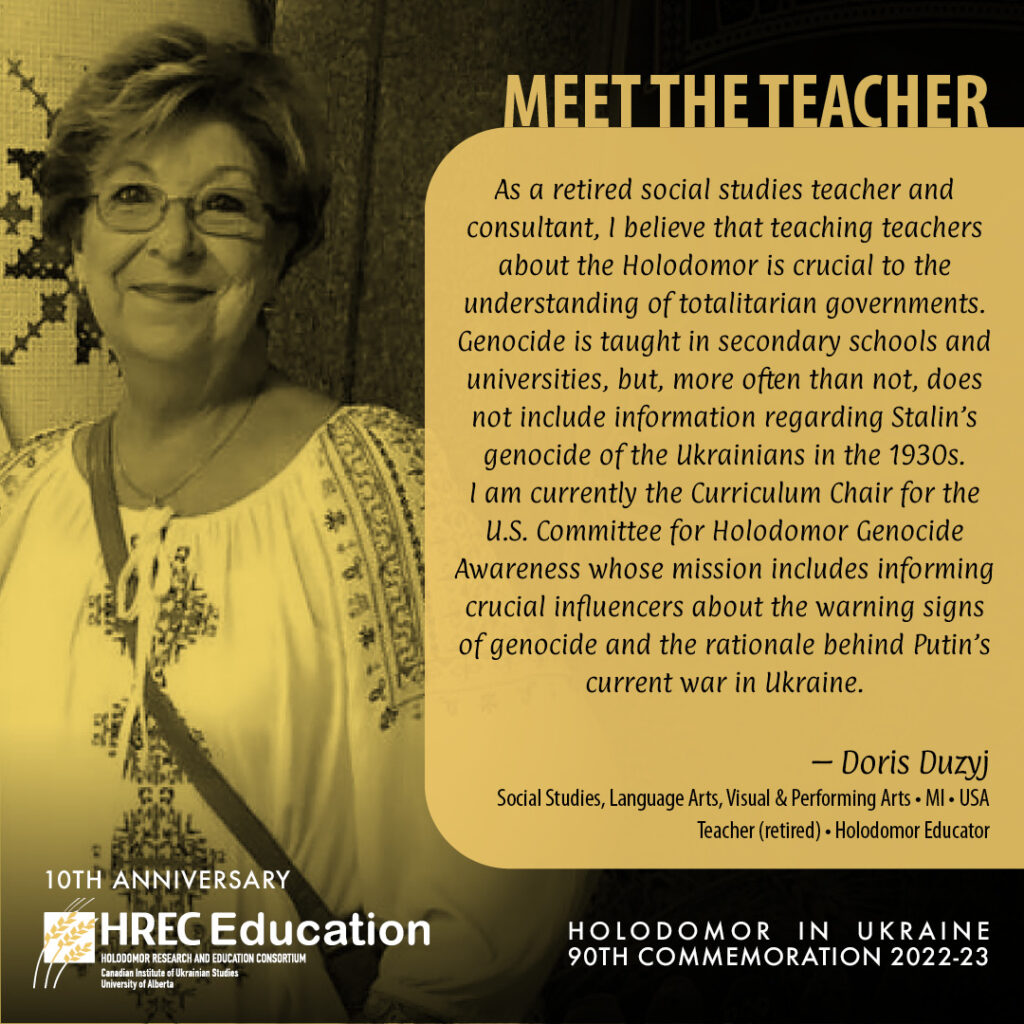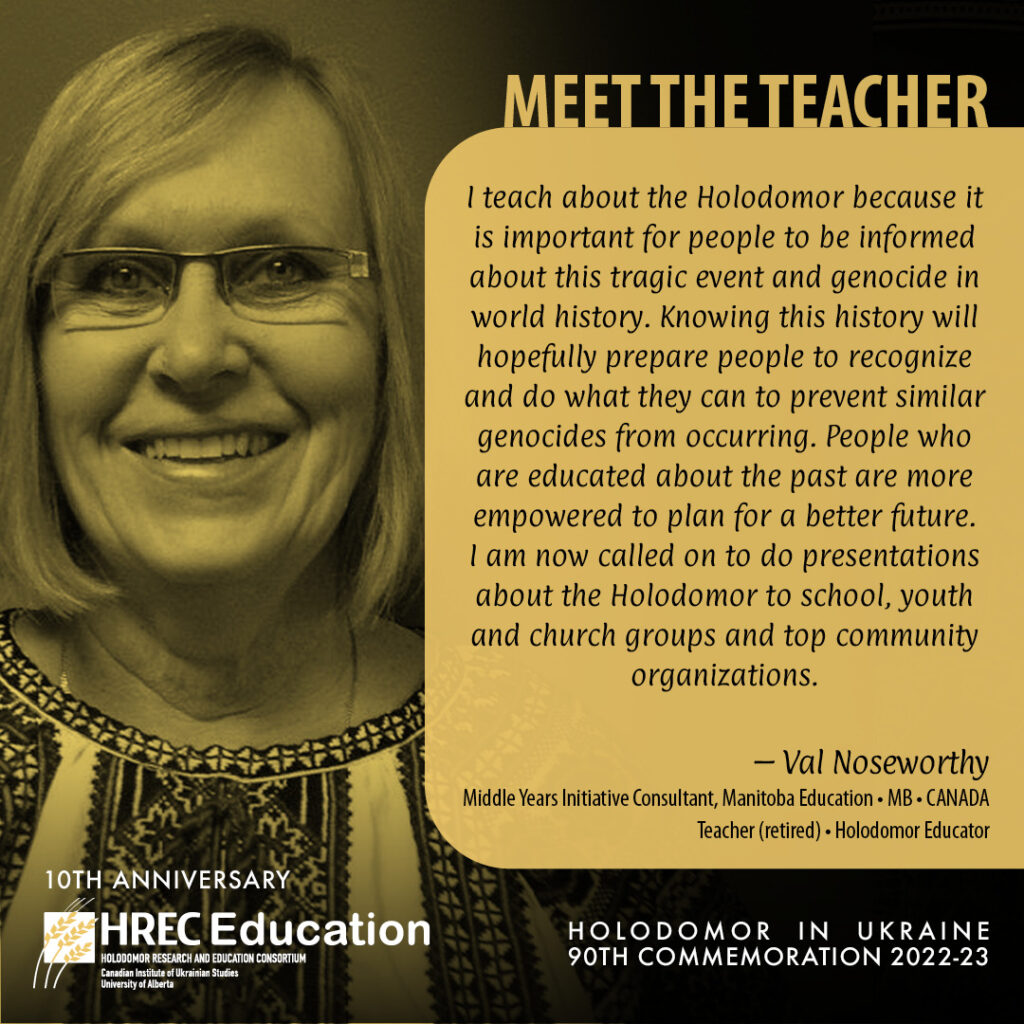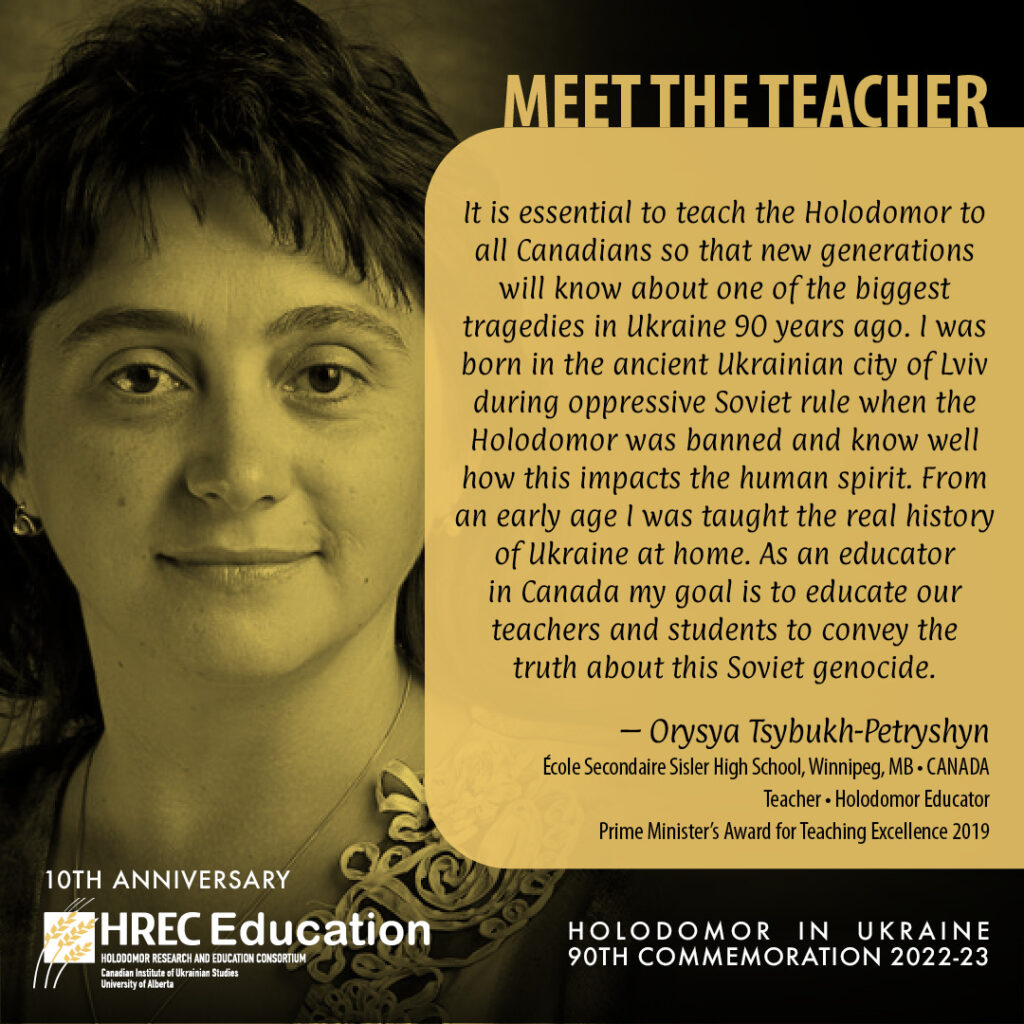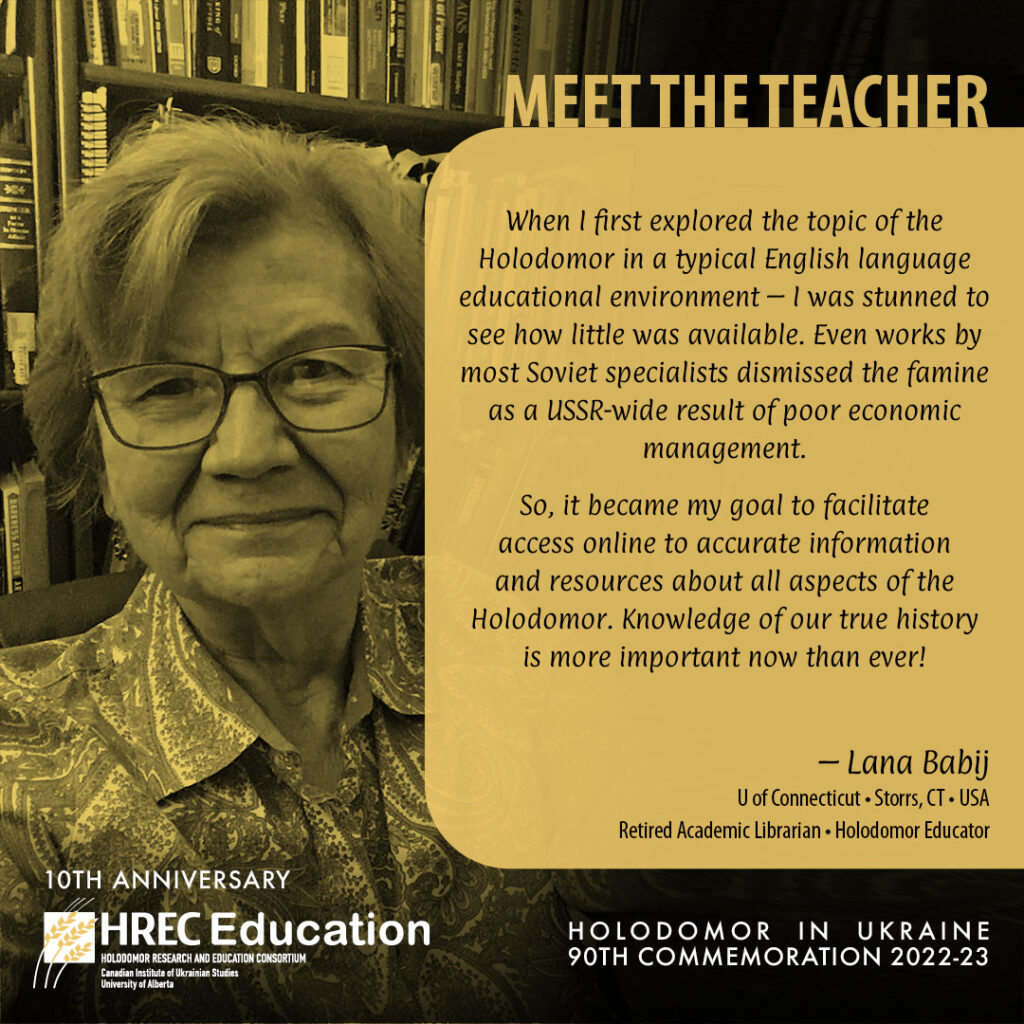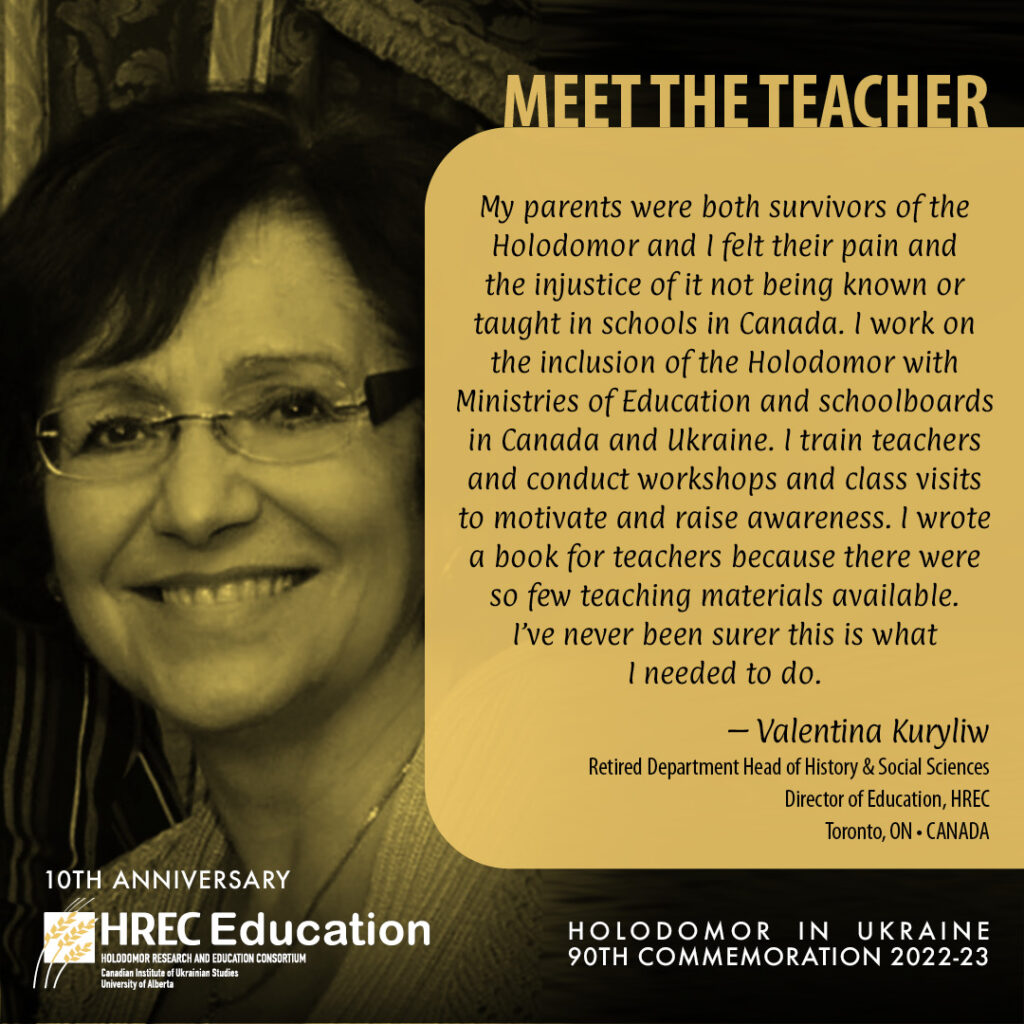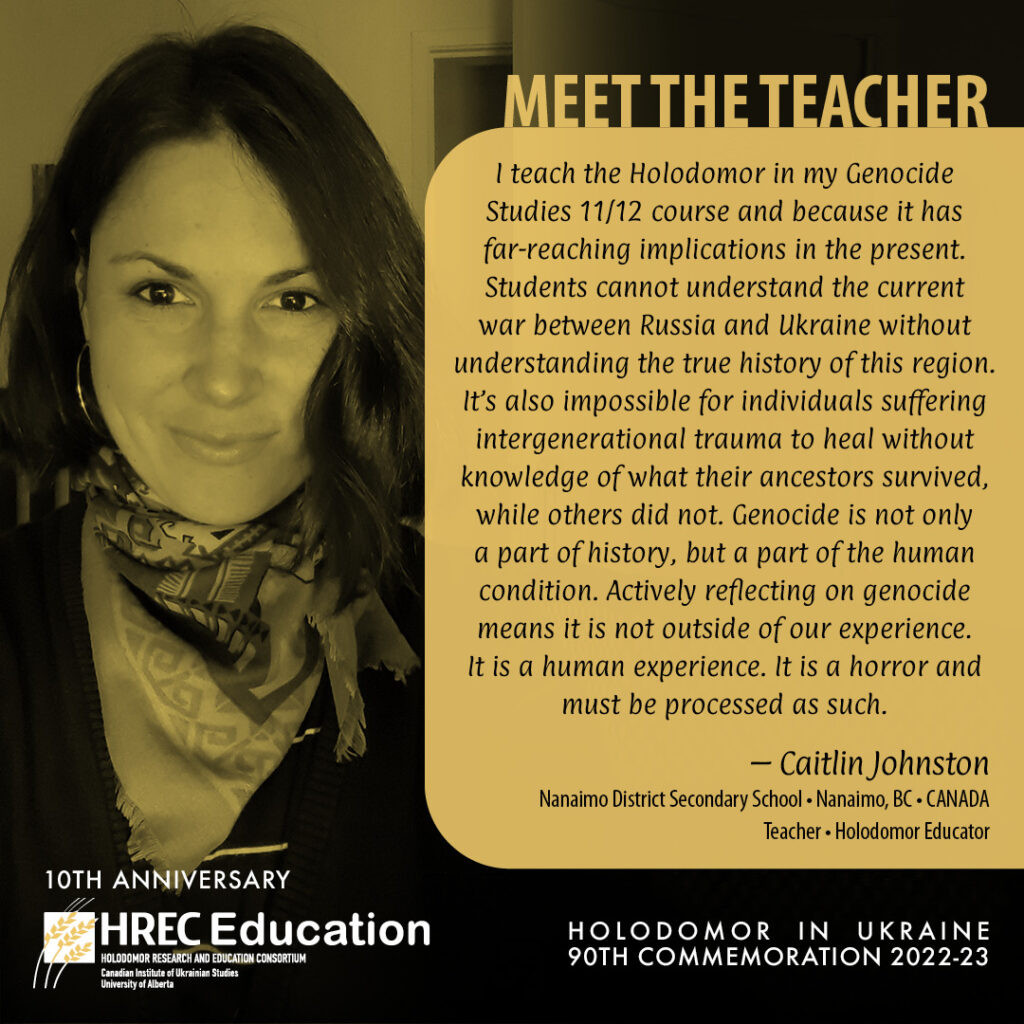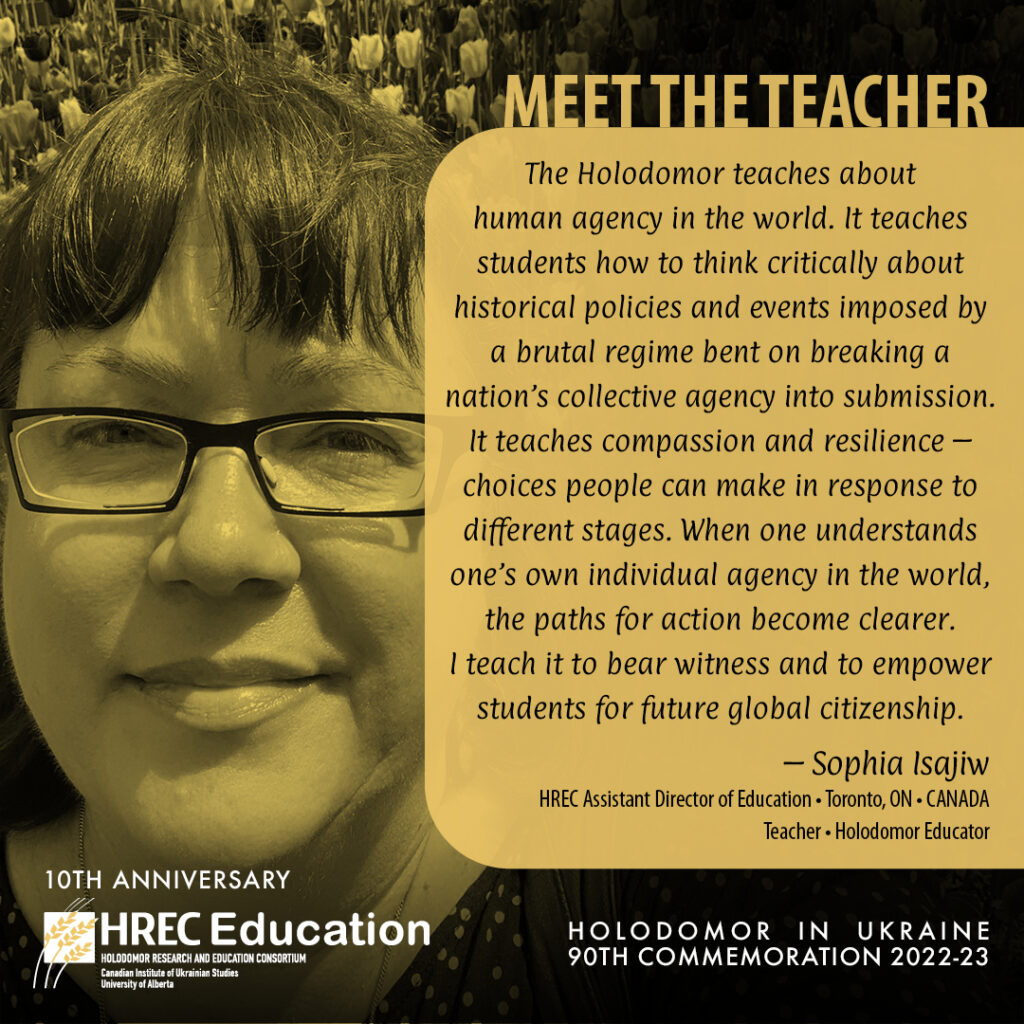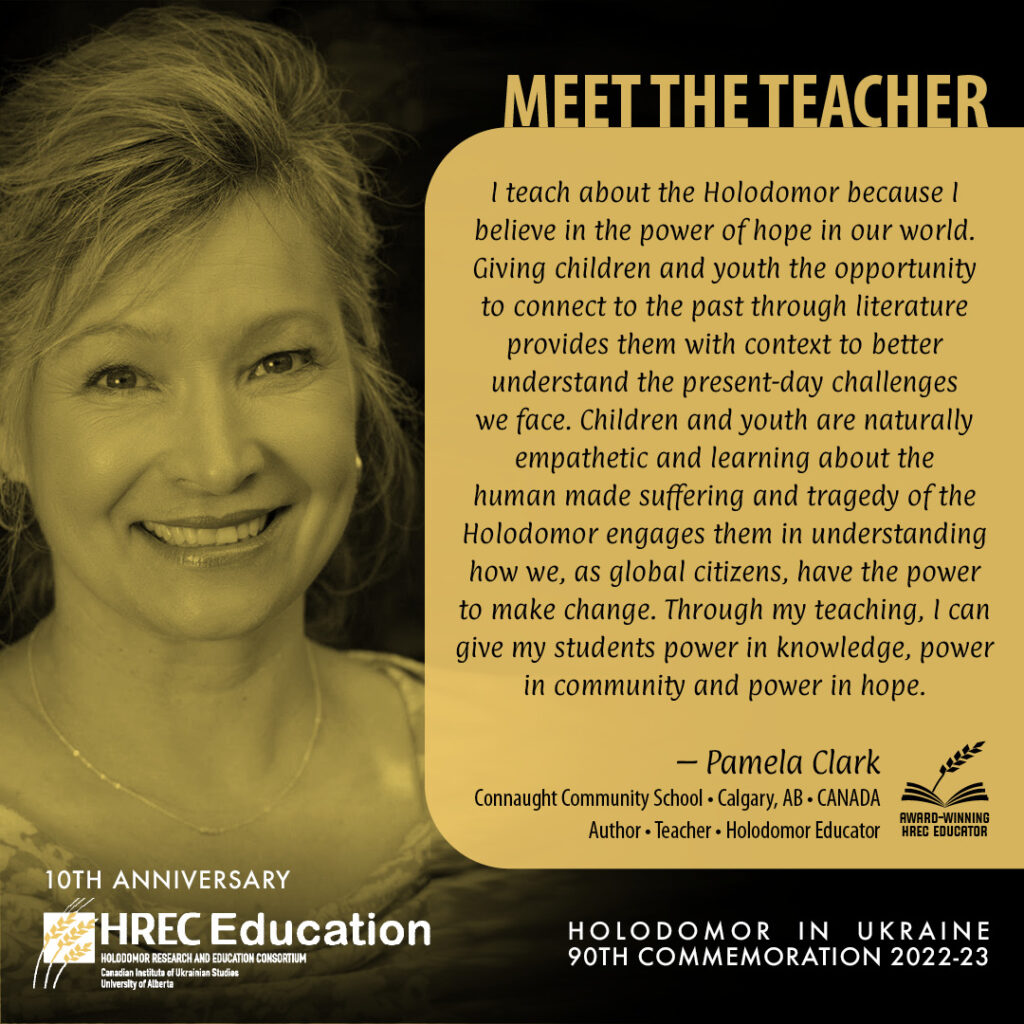Meet the Teachers

It’s HREC’s 10th Anniversary & we’re building our teacher community! Meet educators across Canada & the USA who teach the Holodomor.
Kelly Hiebert
One of the main reasons for diving deep into the topic of the Holodomor, is that we have a large Ukrainian population in Manitoba and many students have never heard of this genocide before coming into my class. It is imperative that we help students and ourselves to confront the worst in humanity, so that these events won’t happen again (despite the many ongoing genocides today). Furthermore, it is essential to help students develop the ability to think critically about historical events, their causes, and to help develop empathy and compassion among students.
Westwood Collegiate • Treaty 1 land • Winnipeg, MB • CANADA
Teacher • Holodomor Educator
Anna Babka
I teach about the Holodomor during my ESL classes to raise awareness and to commemorate my great grandfather Lukian Maksymenko who died in 1933 saving the last piece of bread for his twelve children in Cherkasy region. The topic of the Holodomor is taught in a mainly French speaking environment and is not known among my students. They are very impressed by the work I do and are shocked by the Holodomor and the numbers of victims it caused. The world must know and remember.
École Joseph-François • Perrault High School • Montreal, QC • CANADA
Teacher • Holodomor Educator
Mary Ann Fajardo
Teaching about the Holodomor allows students to reflect and understand how human behavior can affect society.
The Holodomor teaches students many lessons. Students can learn lessons on freedom and overcoming adversity. They can look at this history and understand how people fought back, overcame, and survived. They can look at what humanity can do to each other, the good and ugliness of it. But there are also moments of courage, honor, love, and hope.
Frontier Continuation High School • Whittier, CA • USA
Award-Winning HREC Educator
Teacher • Holodomor Educator
Sue Kenney
I want students to understand that starvation is one of the cruelest tactics of genocide, and has been used from ancient times to modern day. Learning about Ukraine’s fight for sovereignty and Stalin’s barbarous policies during the Holodomor helps students to assess Putin’s current war against Ukraine on a deeper, more meaningful level. Students have the opportunity to see not only oppression, inhumanity and degradation, but also the resistance, courage, and resilience of the Ukrainian people — life lessons students will draw on long after graduation.
Immaculate Heart Academy • Washington Twps, NJ • USA
Award-Winning HREC Educator
Teacher • Holodomor Educator
Olga Chassé
I teach about the Holodomor because I work at a Ukrainian Bilingual school and believe it is my duty to educate students about the history of the Ukrainian nation.
Also, my grandma (baba) was a survivor of the Holodomor and teaching about it always holds personal meaning for me as well.
St. Martin Catholic School • Edmonton, AB • CANADA
Award-Winning HREC Educator
Teacher • Holodomor Educator
Thomas Mueller
I teach about the Holodomor because our students need this knowledge and understanding to be global citizens. Most students are only aware of the Holocaust but must also know about other human atrocities throughout history. The Holodomor was not about drought but human-made decisions. Teaching about the Holodomor also helps students better understand the region; they need to fully understand that the Soviet Union was not a monolithic country but consisted of different nations.
Pennsylvania Western University • California, PA • USA
Award-Winning HREC Educator
Teacher • Holodomor Educator
Jeff Kozak
I teach about the Holodomor because it is important.
It is a genocide that needs to be learned and understood, in order for us as a society and a global community to better appreciate who we are, and how we became who we are.
It gives my students an opportunity to find their voices and an avenue to express their thoughts.
Springfield Middle School • Oakbank, MB • CANADA
Award-Winning HREC Educator
Teacher • Holodomor Educator
Olha Hnatyshyn
I teach about the Holodomor because it is important to raise awareness about one of the most devastating events in Ukrainian history and to honour the victims who suffered; to delve into its far-reaching impact on political, economic, and social spheres — not only in Ukraine, but globally; and to uncover the lessons learned to ensure the prevention of similar occurrences in the future.
Metropolitan Andrey Sheptytsky Ukrainian School Montreal • QC • CANADA
Teacher • Holodomor Educator
Michael Anthony
As a non-Ukrainian teacher, I get asked why I care and teach about the Holodomor. The Holodomor teaches students about the abuses of human rights under a totalitarian government and contains stories about those who stood up against Stalin and told the world what was going on. l want my students to see themselves as upstanders, always, as opposed to bystanders or victims. These are core lessons learned through the history of the Holodomor.
TDSB Virtual Secondary School • ON • CANADA
Award-Winning HREC Educator
Teacher • Holodomor Educator
Natalia Onyschuk
As a Ukrainian Canadian music teacher, I teach children from diverse backgrounds about the Holodomor using the power of song. Every year, the students at my school perform a song that I composed to commemorate the Holodomor. Singing and expressing the lyrics has allowed them to develop a deeper understanding of the magnitude of this historical event. If a child learns about human atrocities at an early age, I believe they will be empowered to build a respectful and just world.
St. Matthew Elementary School • Edmonton, AB • CANADA
Award-Winning HREC Educator
Teacher • Holodomor Educator
Oksana Kulynych
I teach about the Holodomor because while teaching I saw that educators in the school system know nothing about it. Millions of Ukrainian victims of the Stalinist regime could not be forgotten. I am passionate about raising awareness about this genocide by presenting workshops to teachers and students. Recently, I organized a Holodomor Genocide Competition for high school students throughout the U.S. I was very encouraged and inspired by the results where students had to present their project to a class to a group. Many students made the connection between the Holodomor and the current genocide in Ukraine by the same terrorist state.
NYC Department of Education • New York City, NY • USA
Teacher (retired) • Holodomor Educator
Eleasha Milicevic
I teach the Holodomor because of the Two Regimes project and its stories of survival in the darkest of hours. It is something that has been hidden for years and needs to be taught because genocide must be stopped. The Holodomor needs a spotlight shone on it because the state-sponsored starvation of the Ukrainian people by Stalin happened during a time of peace. As survivors’ stories are told and taught, studying the Holodomor shows both the evil side of humanity, through tyranny, as well as its brightest side, through perseverance.
Amos P. Godby High School • Tallahassee, FL • USA
Teacher • Holodomor Educator
Kelly Bowen
I am not Ukrainian but upon learning about the history of Ukraine I am in awe of all the hardships that Ukrainians have endured, and the strength of the Ukrainian people.
I feel compelled by God to help bring about awareness of these genocides.
Curator • The Two Regimes Collection • Tallahassee, FL • USA
Holodomor Educator
Doris Duzyj
As a retired social studies teacher and consultant, I believe that teaching teachers about the Holodomor is crucial to the understanding of totalitarian governments. Genocide is taught in secondary schools and universities, but, more often than not, does not include information regarding Stalin’s genocide of the Ukrainians in the 1930s. I am currently the Curriculum Chair for the U.S. Committee for Holodomor Genocide Awareness whose mission includes informing crucial influencers about the warning signs of genocide and the rationale behind Putin’s current war in Ukraine.
Social Studies, Language Arts, Visual & Performing Arts • MI • USA
Teacher (retired) • Holodomor Educator
Val Noseworthy
I teach about the Holodomor because it is important for people to be informed about this tragic event and genocide in world history. Knowing this history will hopefully prepare people to recognize and do what they can to prevent similar genocides from occurring. People who are educated about the past are more empowered to plan for a better future. I am now called on to do presentations about the Holodomor to school, youth and church groups and top community organizations.
Middle Years Initiative Consultant, Manitoba Education • MB • CANADA
Teacher (retired) • Holodomor Educator
Orysya Tsybukh-Petryshyn
It is essential to teach the Holodomor to all Canadians so that new generations will know about one of the biggest tragedies in Ukraine 90 years ago. I was born in the ancient Ukrainian city of Lviv during oppressive Soviet rule when the Holodomor was banned and know well how this impacts the human spirit. From an early age I was taught the real history of Ukraine at home. As an educator in Canada my goal is to educate our teachers and students to convey the truth about this Soviet genocide.
École Second aire Sisler High School, Winnipeg, MB • CANADA
Teacher • Holodomor Educator
Prime Minister’s Award for Teaching Excellence 2019
Lana Babij
When I first explored the topic of the Holodomor in a typical English language educational environment — I was stunned to see how little was available. Even works by most Soviet specialists dismissed the famine as a USSR-wide result of poor economic management.
So, it became my goal to facilitate access online to accurate information and resources about all aspects of the Holodomor. Knowledge of our true history is more important now than ever!
U of Connecticut • Storrs, CT • USA
Retired Academic Librarian • Holodomor Educator
Valentina Kuryliw
My parents were both survivors of the Holodomor and I felt their pain and the injustice of it not being known or taught in schools in Canada. I work on the inclusion of the Holodomor with Ministries of Education and schoolboards in Canada and Ukraine. I train teachers and conduct workshops and class visits to motivate and raise awareness. I wrote a book for teachers because there were so few teaching materials available. I’ve never been surer this is what I needed to do.
Retired Department Head of History & Social Sciences
Director of Education, HREC
Toronto, ON • CANADA
Caitlin Johnston
I tench the Holodomor in my Genocide Studies 11112 course and because it has far-reaching implications in the present. Students cannot understand the current war between Russia and Ukraine without understanding the true history of this region. It’s also impossible for individuals suffering intergenerational trauma to heal without knowledge of what their ancestors survived, while others did not. Genocide is not only a part of history, but a part of the human condition. Actively reflecting on genocide means it is not outside of our experience. It is a human experience. It is a horror and must be processed as such.
Nanaimo District Secondary School • Nanaimo, BC • CANADA
Teacher • Holodomor Educator
Sophia Isajiw
The Holodomor teaches about human agency in the world. It teaches students how to think critically about historical policies and events imposed by a brutal regime bent on breaking a nation’s collective agency into submission. It teaches compassion and resilience — choices people can make in response to different stages. When one understands one’s own individual agency in the world, the paths for action become clearer. I teach it to bear witness and to empower students for future global citizenship.
HREC Assistant Director of Education • Toronto, ON • CANADA
Teacher • Holodomor Educator
Pamela Clark
I teach about the Holodomor because I believe in the power of hope in our world. Giving children and youth the opportunity to connect to the past through literature provides them with context to better understand the present-day challenges we face. Children and youth are naturally empathetic and learning about the human made suffering and tragedy of the Holodomor engages them in understanding how we, as global citizens, have the power to make change. Through my teaching, I can give my students power in knowledge, power in community and power in hope.
Connaught Community School • Calgary, AB • CANADA
Award-Winning HREC Educator
Author •Teacher • Holodomor Educator
